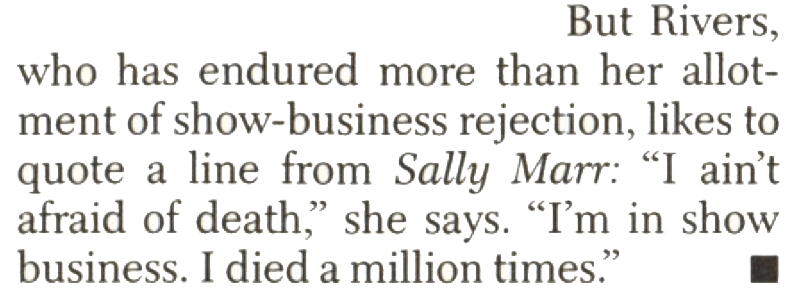
For Joan Rivers, the boundary-busting comedian who died Thursday at 81, no topic was off-limits for a joke.
Not even death. In 1994, speaking to TIME, she told writer Ginia Bellafante that she wasn’t afraid of death. “I’m in show business,” she said, quoting a new play she had co-written. “I died a million times.” In fact, one of the subjects addressed in another project Rivers released that year, a made-for-TV movie about her husband’s suicide, was the fact that her daughter Melissa was unhappy about her mother’s joking about her father’s death. But humor, Rivers believed, was a perfectly appropriate way to grieve. It was a sentiment she had long held; she had told the magazine more than a decade earlier, in 1983, that she thought audiences did themselves a disservice by making death a sacrosanct subject. “When my mother died, I kept going by doing joke after joke,” she said. “I get rid of things through very black humor.”
Which is not to say that everything Rivers joked about was serious. TIME’s 1983 profile explained that in Rivers’s house she had 12 drawers of jokes written on index cards, carefully sorted by category: “such topics as Drugs, Face Lifts, Beverly Hills, Homosexuals, My Body, and No Sex Appeal, which has the most entries, more than 400.” And, of course, as her red-carpet-special audiences knew, she could be especially biting when it came to her fellow celebrities. That same article touches on jokes about Queen Elizabeth ( “I put a doily under the Kitty Litter. She was very impressed. She took it home for a hat.”), Nancy Reagan (“She’s a great lady. She never swears. She told me to go and reproduce myself.”) and Elizabeth Taylor (“Mosquitos see her and scream ‘Buffet!'”).
Rivers was first profiled by TIME in 1966. The article makes clear that these topics had long been a fertile area for her. “Snapping out her lines, bobbing and weaving around the stage like a pug in the last throes of brain damage,” TIME wrote, “she is an unindexed handbook on how to be neurotic about practically everything.”
On the subject of her body, for example:
Joan Rivers claims that she is now only a thin blonde disaster area, where once she was a fat blonde disaster area. In high school, she says, “I got to be chairman of the decorating committee for the prom. We decided to hold it at the Waldorf-Astoria Hotel, in the Grand Ballroom. I made it look just like a gymnasium. Then what happens? I was the only girl not asked to the prom. My father is a very sensitive, perceptive person, so he said, ‘Look, Lump, we’ll get your cousin to take you.’ My cousin! Think of the humiliation! And my cousin, she didn’t want to take me either.”
Or:
Take wigs. The ordinary woman puts a wig on her head and that’s that. Joan’s wig gets run over by a car—and then the driver gives her $10 and his sympathy for having killed her dog.
But even when she was at her most caustic, her idea that nothing was sacrosanct didn’t mean she didn’t care. In 1983, when TIME called her “the funniest woman in the country,” she explained that the best comedy is “always on the brink of disaster,” walking the line between boring and going too far. The article began with the following anecdote:
“If I say anything vicious, just add afterward the words: ‘She laughed.'” So, to grant the lady her request and, at the same time, to avoid repeating those two words several dozen times, please regard most of the punctuation marks that follow as shorthand symbols for “Joan Rivers laughed.”
Read TIME’s full 1983 profile of Joan Rivers here, in TIME’s archives: Barbs for the Queen (And Others)
More Must-Reads from TIME
- Why Trump’s Message Worked on Latino Men
- What Trump’s Win Could Mean for Housing
- The 100 Must-Read Books of 2024
- Sleep Doctors Share the 1 Tip That’s Changed Their Lives
- Column: Let’s Bring Back Romance
- What It’s Like to Have Long COVID As a Kid
- FX’s Say Nothing Is the Must-Watch Political Thriller of 2024
- Merle Bombardieri Is Helping People Make the Baby Decision
Write to Lily Rothman at lily.rothman@time.com